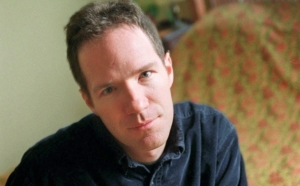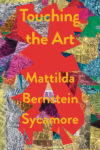 Rick Moody is a polarizing figure in the literature and criticism world. He’s been called “the worst writer of his generation” while also being praised by numerous outlets ranging from The New Yorker to The Washington Post. He’s aware of this, but doesn’t talk much about it. In fact, he doesn’t put much stock into reading reviews. Except recently during research for his latest novel, Hotels of North America.
Rick Moody is a polarizing figure in the literature and criticism world. He’s been called “the worst writer of his generation” while also being praised by numerous outlets ranging from The New Yorker to The Washington Post. He’s aware of this, but doesn’t talk much about it. In fact, he doesn’t put much stock into reading reviews. Except recently during research for his latest novel, Hotels of North America.
The novel is told nearly entirely in reviews about hotels that were stayed in and written by Reginald Edward Morse, a middle aged man who lost it all in the Great Recession and is trying to bounce back. It’s a very meta book, a commentary on the world we live in now.
Adam Vitcavage: What was the genesis of Hotels of North America?
Rick Moody: I was trying to write a different book. I was trying to write a more conventional novel in the beginning of 2009. I wrote 250 pages of it. All I could feel was the weight of the tradition. I was not happy. I wasn’t happy with the book, I wasn’t happy with myself writing the book. About the same time I was traveling with my wife—she’s a visual artist—and she had a show in Bergen, Norway, and we were in the most godforsaken awful hotel. Everything was wrong with the hotel. The art on the walls had been taken down and there was some grimy mildew. It was tiny and the pillows were cardboard. Everything about it was unspeakable. Her suggestion was that we should review the hotel.
I wrote out this thing about how bad the hotel was. In the middle of doing it I thought, “Why shouldn’t I try to make a novel out of this?” It was really a reflection of feeling like the traditional novel doesn’t describe the times as I am experiencing it now. Trying to make a novel out of some online weirdos posting about hotels seems much more reflective of where we are now than trying to go back and write the novel of 150 years ago.
Who is Reginald Edward Morse to you?
I felt like if I was going to make this novel out of this bizarre subliterary material, I needed the character first. That was sort of the starting point of the adventure. In the past, like with The Ice Storm let’s say, I always started with the landscape and the predicament, and then I figured out the characters by knowing their social setting and everything. In this case, the guy doesn’t have a social setting; that’s kind of what the book is about. It’s about all places. Getting the character was essential. I had to find the voice. I had to figure out how this guy writes, why he writes, what kind of writing style he has. Then fill in the guy around that voice. Laurence Olivier said he had to put on the clothes of the character and he would be able to feel the character. I felt if I got the voice first then the facts would fill in around his voice.
To answer your question about who I think he is: I think he is an overwrought, slightly desperate, tragicomic guy who fell out of the economy after the Great Recession, and is struggling to find equilibrium and trying to get back on his feet somehow.
His name is R.E. Morse—remorse—which is a theme you worked into this book. Do you let it seep into other works?
Well, aren’t we all to some degree? I plead guilty as charged. It’s a powerful, deep well spring of feelings on which one might embark on writing something or other. Yeah, it’s helped me.
Was he necessarily meant as a social criticism of the remorseful struggle that society has felt?
I think that’s in there, and that it’s always in there in my work. I always hope there’s a political backdrop and a social backdrop to my work. I was really thinking and hoping that he would appear to be a social phenomenon upon which we could put our fingers on the sense of saying this is the kind of character being generated by the digital age. Yearning, unhappy, foaming at the mouth, an online troll of a kind. I wanted it to be perceptive of where we are now.
Speaking of foaming at the mouth online trolls: what has been your experience with that kind of person?
[Laughs] All of the time. Every book I’ve written—and it’s been especially true on the last three or four—seems to have had one or two of these reviews where I seem to be an emblem of all that is wrong [in literature]. It was for that reason that I never really read online reviews at all until I started working on this book. I certainly never read Amazon reviews. I never read reviews of anything really. Once I started making Reginald Morse I got interested in hotels.com, Yelp, and going on there and seeing what people do and how they do it. It turns out that it’s a crazy, vital, energetic, weird backwater of American language.
When you were researching this, did you focus a lot on just hotel reviews, or any kind of review? Is this how you found Morse’s voice?
I definitely read hotel reviews. I obviously wrote at far greater lengths than those people would. There was an attempt to break the mold in order to make the character feel credible and idiosyncratic. I read a fair amount of hotel reviews, and I really enjoyed reading them. The worse they are, the better they are in a way. Occasionally when I would get stuck I would go online and sort of bulk out by picking the worst hotel I could find and then read some of the reviews.
That was a big help, but I did in fact read other stuff. I read Yelp. There’s one actual Amazon review that is quoted at length in the book. My wife actually found it. I would read an Amazon review as long as it is not a book, or related to me.
Was there an arc you wanted to piece together?
I discovered an arc, but I discovered that arc through improvisation. When I began, I didn’t really know all of the facts of his life. I felt that if we are compiling two years of reviews from this guy, he is not going to tell his story in an orderly fashion. He is going to tell it in an impulsive way. I discovered his story as he was allowing bits and pieces of it to emerge. What I did was write something like 275 pages of reviews knowing that I would cut. I cut so that I could hone in on the arc of the trajectory of the story. Eliminate and refine so I could find out what he was trying to say. Over the course of revision I think I got the sense of it. I didn’t know at first, but I knew once I refined.
Was his second career as a motivational speaker linked to your real life “life coaching” experience?
The motivational speaker thing was meant to be a joke about what writing is and the way a lot of contemporary fiction has to ratify humanism, good conduct and ethics. Which I object to in some way. I feel you should tell the truth even when the truths are uncomfortable. The motivational speaker thing was sort of a jab at conventional naturalism and the tendency to create likable characters.
It’s also true that I do have a byline as a life coach online. I did that originally for my own amusement, but increasingly out of the sense of duty and responsibility to the people who write to me. So motivational speaking is also an in joke about the fact that I have been doing that stuff at the same time.
You mentioned that you don’t like the conventional aspects of novels. Do you always try to have an unconventional idea when it comes to projects?
I really do like structural or strategic limitation in what I do. I like trying to think of a new wrapper for a project, a new context or a new way to present the book so that it doesn’t just sort of sit there and do what they do otherwise. That’s what gets me excited. When I come to the idea that I can make a book out of hotel reviews, then suddenly I’m interested. In a way it’s paradoxical because having that limitation enables me to talk forthrightly about life as lived in a way I couldn’t do if I was just making a domestic drama with people arguing timidly in the living room over something. I couldn’t write that scene if I was meant to write it in someway. If it’s going to occur in the context of a hotel review, then suddenly I can do it. The strategic limitations and the non-traditional structure are some of the things that make it possible for me to get to the regular lives that I want to try to get to.
What were some challenges and limitations you had to try to overcome writing this project?
First there was the obligation to try to deal with hotels in each piece. Balancing that with telling Morse’s life story was a balancing act. It could have tipped over one way and not have been as rewarding to me. That was one problem. And the second, which was actually the biggest problem with the book in some ways, was all of these dates. I had to make multiple timelines to make sure I wasn’t putting him in two hotels at the same time—that the progression of his life would stay visual to me while I was writing new portions of the book. Secondarily, there was the question of when he published specific pieces. It turned out it actually making the timeline stick was demanding. I was actually still fixing mistakes in the timeline up until the last day of when the book was about to close.
I had to keep referring to the different dates just to make sure.
That’s what happens when you come up with this shit. There are structural ramifications and creative ramifications of the ideas that bear out. It was interesting to me that this would be how the idea would play out in the real world. I always say to my writing students that in many ways the novel is always about time and the effect of time on characters. That’s exactly how this book played out: I had to wrestle with the idea of time.
So this was a pretty unique novel to have to write, but what is a normal writing process for you?
I’m pretty idiosyncratic about it at this point. A lot of Hotels of North America was actually written in hotels. Not the specific hotels that were reviewed, but on the road. First thing in the morning in bed or in the tub I would bang out 700 words about the hotel. I could have the feeling of the hotel around me as I was writing it. I could visualize it because I was there. That’s a lot how this book got written.
Nowadays, because I’m teaching a lot and I have a small child, writing is sort of a bingey model of productivity. When I could get a couple of days when I could write for four or five hours, I’d take advantage of it. Otherwise I’m just fitting it in around a lot of activities, which is very different than how I worked in my 30s and 40s when I had big chunks of time.
Why did you decide to include the preface from the fictional director of a hotel association and an afterword by you?
It emerged later in the process. It was in part because the editor of the book wanted to alert the reader that the book wasn’t going to be chronological. It was to inform the reader that the experience was going to be unusual and he thought the preface would do that. I honored that request and it became a fun exercise for me because I wanted to get the voice of that character down really well. The afterword was trying to contextualize the book in the history of the novel in a way. I was trained into a period of novel writing that sees fiction as artificial and not a realistic vehicle, but a set of simulations. It’s a process of simulations. It doesn’t mean it isn’t true and accurate emotionally—I hope it is all of those things, but it is a code. It’s a whole frothy, beautiful hoax.
What’s the biggest piece of advice or maybe a little nugget that you give your students?
I often tell people not to think. I think that’s really good advice for writers. I’ve noticed this a lot in recent weeks talking to my grad students: they get preoccupied with what’s happening in the marketplace, preoccupied with how they are going to finish the book, preoccupied with larger questions of the effect of the book and so on. In doing that they silence themselves and impede the process. I think that books get written out of 10,000 tiny little opportunities to sit at the word processor. Once you get the draft down you can do anything with it. So thinking about what’s going to happen in advance is just a prescription for writer’s block. Whereas if you don’t think and just do the work and let the story emerge from you or your subconscious, then it will happen and you’ll get it done. You can work on it thereafter and tighten it up, but if you don’t get a draft, you will never get a book.
And what are you currently drafting?
I’m making a memoir next. I wrote one [The Black Veil: A Memoir with Digressions] that came out in 2002, and now I’m doing one that is largely about marriage. I’m also writing stories. I have a collection kind of already done. I’m just sort of sequencing and thinking about what might get cut and what might remain.
What themes or type of stories are in that collection?
My story collections have always been about range. There’s not one particular scene, but really a bunch of different approaches. In fact it’s probably more radical in regard to formal invention and the strategic limitations we were talking about than anything I’ve done. It’s around fourteen stories and each one is dramatically different structurally than the others.
And is that memoir about marriage in Yelp review format?
[Laughs] I don’t know if my wife would like that.
Maybe you can give me a few reviews right now before we finish up. What’s your best hotel experience?
Wow, that’s such a good question. [He turns away from the phone to ask his wife] What was our best hotel experience? Laurel says we stayed in a really good hotel in Portland, Oregon that has philosophers on the wallpaper. I really liked that one. I really liked the Standard Downtown in Los Angeles. It’s ridiculously hip. I think pay models to hang around in the lobby. I don’t know that to be the case, but it certainly seems like that. [There’s a pause as he listens to his wife] Laurel says there are models in a clear glass box. They had really great food, and I even got my haircut there. It’s sort of quirky, but really fun. It’s not in the book, but it got cut.
Without naming names, unless you want to, what was the worst hotel experience? Was it that Norway trip?
There have been so many challenging ones. We stayed in a really bad one in France not too long ago. We stayed in a really small one in Denmark where you could brush your teeth and get into bed at the same time. I’m not going to give it away, but there is one in the book that is totally true that is a European hotel. We’ve been in some bad ones in America too, but I expect chain hotels to be bad. They never surprise me. I always feel proud that I’ve survived them. In Europe I don’t know what to expect and a lot of them are independent, so it’s not like a cookie cutter experience.
I find that hotel experience is about expectation. A really great hotel could be a three star that has much better service than you thought they’d have, and a really bad hotel was one where you thought it’d be okay but it turns out to be dingy and horrible in an unsuspected way.
Adam Vitcavage is writer and an American Literature teacher who lives in a suburb of Phoenix. His work has appeared in Paste Magazine and the Millions. You can follow his daily antics on Twitter at @vitcavage. Find more of his thoughts at www.vitcavage.com.
This post may contain affiliate links.







